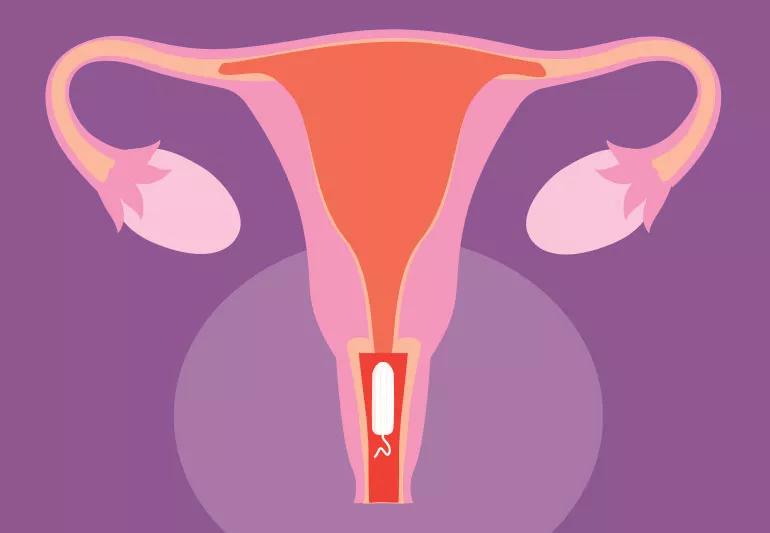It can get squished and lodged, but not lost

Image content: This image is available to view online.
View image online (https://assets.clevelandclinic.org/transform/1da39a44-9d27-4543-88d5-7f0da53e1c62/tampon-in-uterus-1253922218-770x533-1_jpg)
Drawing of female reproductive anotomy with a tampon in vagina.
Tampons are popular because they’re easy to use and they allow you to keep living your regular life while you’re on your period. But every once in a while, a tampon gives you trouble.
Advertisement
Cleveland Clinic is a non-profit academic medical center. Advertising on our site helps support our mission. We do not endorse non-Cleveland Clinic products or services. Policy
Maybe you forgot you had one in, so you put in a second tampon without removing the first. Or maybe you had sex and didn’t even think to take out your tampon before you got busy. Either way, that little piece of cotton is now lodged somewhere up inside of you — and you’re probably freaking out.
Good news: This predicament is more common than you might think, and it’s pretty easily remedied. Certified nurse practitioner Sara Youngblood, CNP, explains how a tampon gets stuck, what to do to remove it and when to seek help from a healthcare provider.
First, some reassurance: There’s absolutely no way to lose a tampon in your body. It can get stuck in your vaginal canal, but it can’t go any farther than that.
That’s because your vagina is sort of like a dead-end road. You insert a tampon into your vaginal canal, which is only a few inches long, and that’s where the road ends. At the back end of your vaginal wall is your cervix, which acts as a barrier between your vagina and your uterus. And the cervix isn’t just a “Do not enter” sign that tampons can sneak past — it’s more like an impenetrable brick wall.
“The opening to the cervix isn’t even remotely big enough to let a tampon into the uterus,” Youngblood explains. “Based on the physiological components of the reproductive system, there is no physical way for a tampon to get past your vaginal canal and into the rest of your body.”
Advertisement
Although tampons can’t go farther than your vagina, they can get lodged in there. Your vaginal canal is only three or four inches long, but sometimes, a tampon can get stuck just out of your reach.
If you accidentally have sex with a tampon in, or if you put in a second tampon without removing the first, it can get pushed high up in your vaginal canal, where it can get squished or turned around. And when you lose track of the string, removal can get a little complicated.
“It may not be totally easy to find or to remove a tampon,” Youngblood says, “but there’s always a way to be able to get it out.”
A tampon that has taken up residence in your vagina is unlikely to come out by itself, so it’s important that you take steps to remove it.
“Leaving it in or not knowing that you have a retained tampon can lead to serious health concerns,” Youngblood warns. Wearing the same tampon for longer than eight hours can lead to:
First things first, take a deep breath and try not to panic. Though you may not be accustomed to poking around inside of your body, it’s the best way to remove a tampon that’s gotten lodged a bit too far north.
“Insert one or two fingers into your vagina and gently feel around to see if you can find the string or actual tampon itself to pull it out,” Youngblood instructs. Try using your ring finger, your middle finger or both of them at the same time so you can reach as deep into your vaginal canal as possible.
Here are some other tips for safely retrieving a retained tampon:
Advertisement
“If you aren’t able to get a stuck tampon out by yourself, it’s time to see a medical professional to help remove it,” Youngblood says.
Call your family doctor or Ob/Gyn’s office, and if they can’t fit you in, they might refer you to urgent care or express care, where you can be seen faster. Typically, a healthcare provider can easily remove a stuck tampon using their fingers or a small clamp. It may be uncomfortable, but it probably won’t hurt — kind of like an average pelvic exam.
And although your instinct might be to feel embarrassed about asking for help removing a stuck tampon, try to remember: You’re not the first person this has happened to, and you won’t be the last. Your medical providers have seen this before, and they’re there to help you, not to judge you. Your health is more important than your pride!
Advertisement

Sign up for our Health Essentials emails for expert guidance on nutrition, fitness, sleep, skin care and more.
Learn more about our editorial process.
Advertisement
It’s important to angle it toward your rectum or back, along the natural curve of your vaginal canal
Yes, you can pee with a tampon in; no, they won’t stretch out your vagina or make cramps worse!
Nothing scented should go in or around your vagina!
It depends on your menstrual flow, and a little trial and error
Yes, with the right absorbency level and maximum time-frame
Homemade doesn't always mean safe
From using one at night to how often you should change them
Use them within five years and store them someplace cool and dry
Although it could be used as a moisturizer, this new trend is not recommended
Communicating clear limits helps protect your time, energy and emotional well-being
High cholesterol can be genetic, but testing and treatment can lower your heart disease risk